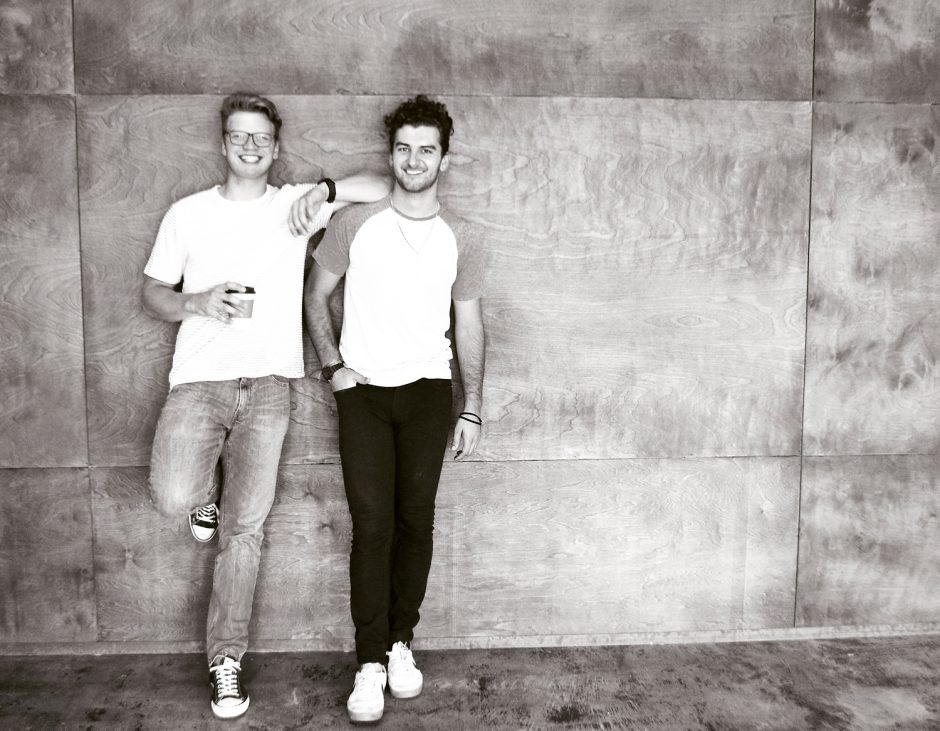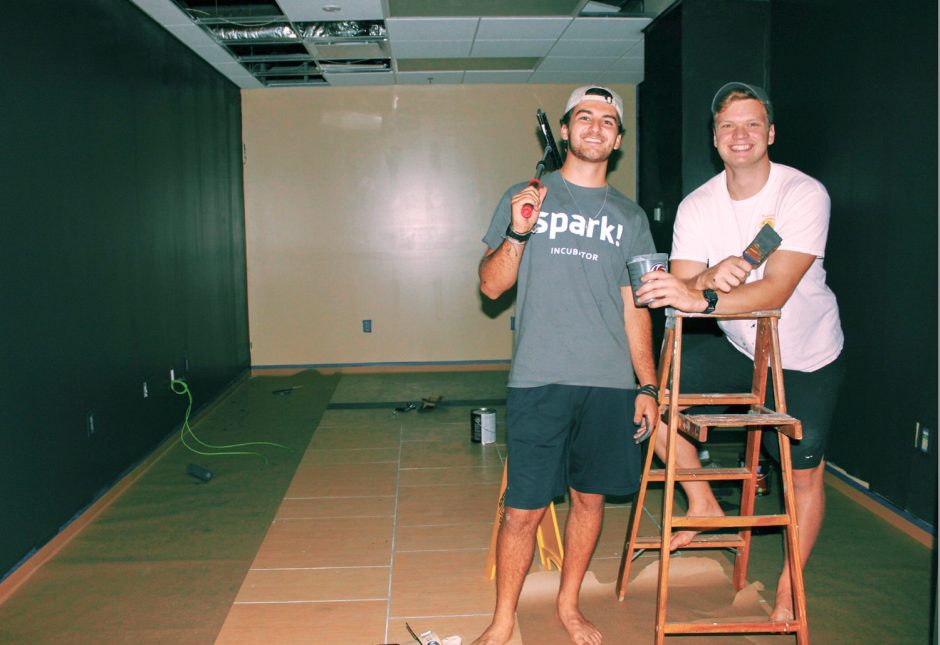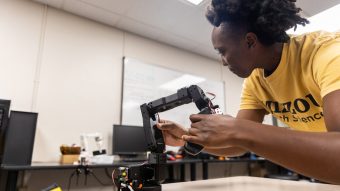
Thomas, a finance major, and Rogers, a strategic communications major, have stared at whiteboards together before. They grew up friends in Ballwin, Missouri, though not always super close. But their similar interests kept drawing them together. They both participated in Spark!, a business incubator in St. Louis for high school juniors and seniors, where they developed their entrepreneurial skills under the mentorship of top area business leaders. The experience opened their eyes to the power of learning outside the classroom.
Mizzou, home of the Missouri Method, a learn-by-doing approach that has seeped into curricula across campus, was a natural fit. (It also doesn’t hurt that both young men were born to Tiger alumni and have been sporting black-and-gold since before they could walk.)
They came to Mizzou as freshmen looking to plug in to the undergraduate entrepreneurial community, but they struggled to find it. Then they heard about the Missouri Student Unions Entrepreneurial Program and the chance to open their own business in the Student Center rent-free and utility-free. There was no way they weren’t applying.
Watch This Space

The Entrepreneurial Program began in 2010 with the opening of the MU Student Center, which replaced Brady Commons.
Administrators in MU Student and Auxiliary Services wanted to incorporate student-learning opportunities into the new space, and they saw an opportunity to do so by partnering with the building’s corporate tenants.
U.S. Bank, an original tenant that still leases a space in the student center, agreed as part of its rent to provide free financial literacy training to students and $20,000 a year in student scholarships — including $2,000 a year to cover startup costs for student-run businesses in the center.
The entrepreneurial program uses a competitive application process that forces students to think ahead. They can’t pitch only a business idea; they have to back it up with a business plan, marketing plan and budget. At first, only one winner was selected each year, though recently space has opened for two.
Not all businesses have lasted past their year in the student center, but the original tenant, MizzMenus.com, a restaurant-meal delivery service, is still operating in Columbia.
Until now, no business has been allowed to stay in their space longer than a year. That is about to change.
A Business for Businesses
From the start, Rogers and Thomas approached their business concept with a different mindset. Instead of thinking only about what they could sell that people would buy, they said, “Let’s take a step back and think about what we can do to promote entrepreneurship on campus,” Thomas says.
That is what they hammered out on their whiteboard. They developed a concept for a one-stop shop for student and alumni entrepreneurs. They would reach out to anyone on campus who made anything — T-shirts, hats, jewelry, stickers, books, greeting cards, etc. — and offer them shelf space on consignment. Seventy percent of the sales’ proceeds go back to the product creators, a very generous cut for a brick-and-mortar outlet.
They put together a 20-page business plan, pitched their idea — and won. But their innovation was just beginning.
Rogers and Thomas were building their business around a mission — “to empower the creatives.” They reached out in person and through social media to develop a range of partners to supply inventory. They reached out to Missouri Student Unions for marketing advice. “We don’t have everything figured out,” Rogers says. “We had to swallow our pride and say, ‘Help me learn.’ ”
They learned quickly.
At the start of the semester, when Mizzou Tour Team members walked past with groups of prospective students and their parents, the tour guides would give the general spiel: “This is The Bridge; it’s one of two student-owned businesses in the student center.” But Rogers noticed the effect of the store’s marketing in just a few weeks. He says the tour guides ditched the two-second explanation and instead would explain animatedly, “This is The Bridge; it’s really cool. They sell student-made products, and their mission is to empower the creatives on campus.”
Rogers would sit behind the counter in his store and smile. “Yeah! That’s right.”
In the first three months, they sold $23,000 worth of merchandise, quickly establishing themselves as a major driver of the student entrepreneurial scene.
Their doors were barely open before their suppliers and customers were wondering what they would do once their year was up. They didn’t have an answer, so they went back to the whiteboard.
Becoming Relevant
Just as when they were dreaming up the idea for The Bridge, Rogers and Thomas started with the big picture.
“We really thought a huge value we were getting from The Bridge is educational,” Rogers says. So they thought, “How can we educate students and give them experience through this business?”
The answer they came up with is Relevant Youth.
Modeled somewhat after Spark!, Relevant Youth will be an internship program that gives students the chance to provide real-world marketing, business strategy and financial help to The Bridge’s small-business suppliers. Rogers and Thomas are also recruiting mentors for the program from businesses looking to hire Mizzou graduates.
They just got approval from Missouri Student Unions to launch the program, which entails keeping The Bridge open for another two years in its student center space.
If successful, Relevant Youth would be a win for student creators on campus, who would get free business help from other students; it’s a win for Rogers and Thomas, who keep The Bridge open and can try to expand their entrepreneurial dreams; it would be a win for the student interns, who would get experience and career connections through their mentors; and it would be a win for the corporate mentors, who get a no-risk opportunity to observe students’ soft skills in action.
Rogers sees the program as part of a natural progression of using the lessons and skills learned from one opportunity to open ever-broader subsequent opportunities. Or that’s what it looks like in retrospect anyway. Day-to-day, “it’s a slow process of failure and adaption,” he says.
They expect to launch the new program at the start of the fall 2017 semester.
“It’s going to be excellent,” Rogers says. “Ten out of 10.”
Apply or learn more: therelevantyouth.com
Share the good news about an exceptional Tiger! STUDENT HONORS »



